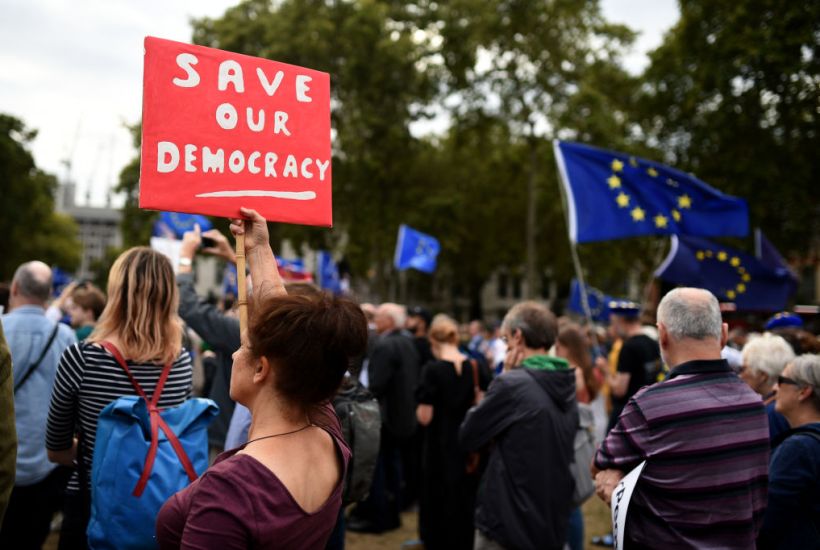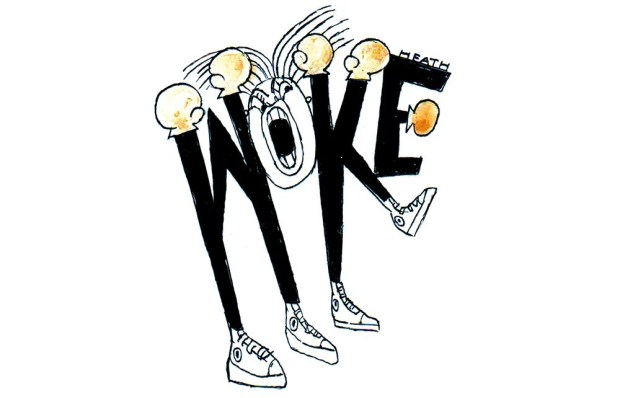Extinction Rebellion (XR) has announced it will finish its ‘Autumn Uprising’ earlier than planned in order to make way for the People’s Vote march on Saturday. The two groups have been in informal discussions for some time aimed at avoiding getting in one another’s way, according to a report in the Times. Even if the Metropolitan Police’s draconian city-wide ban on XR may have made such a deal unnecessary, it reminds us how much the groups have in common.
It’s not exactly a stretch to say these two predominantly bourgeois movements may have some crossover in support. Talking to the Times, People’s Vote comms chief Tom Baldwin said:
‘I don’t think they’ll want to disrupt us and a lot of them will want to join us on our march’.
Although XR says it is neutral on Brexit it is hard to believe many among its number are passionate Brexiteers, perhaps taking time off from bricklaying in Dagenham to glue themselves to Westminster Bridge.
But the kinship runs deeper.
Both bristle at democracy, even though they use the language of democracy. The People’s Vote crowd want to overturn the biggest democratic mandate in British history. They want ‘the people’ to have another say, purely in the hope we will say what they want us to this time.
Extinction Rebellion, meanwhile, wants a ‘citizens’ assembly’, guided by handpicked experts, to ‘discuss and make recommendations on how to respond to the climate emergency’. Which clearly wouldn’t allow much room for any citizens to dissent from the eco-alarmist line.
Both PV and XR also have a lot of friends in high places. The People’s Vote campaign was spawned by people from the official Remain campaign. It counts multimillionaire businessmen among its donors. While XR’s anti-growth, eco-austerity message understandably hasn’t got quite the same backing from fat cats, it still has some serious money behind it. In the summer it was revealed three wealthy philanthropists, one from a rich oil family no less, donated half a million to XR and the allied School Strikes movement.
Among the cultural elite, too, both campaigns have been instant dahlings. Patrick Stewart, Steve Coogan and the bald bloke off Mock the Week are among the People’s Vote campaign’s celeb supporters.
Extinction Rebellion is backed by bestselling authors like Margaret Atwood and Philip Pullman; and its protest handbook, This Is Not a Drill, is published by Penguin. Just nine months after XR began, the Victoria and Albert museum acquired a number of its ‘artefacts’ to display.
None of this discredits the message of either of the two campaigns, of course. Spokespeople for both PV and XR are perfectly capable of discrediting themselves, whenever the media bother to give them a proper grilling. But the embrace of Extinction Rebellion from certain sections of the establishment, and the fact that the People’s Vote campaign, responsible for some of the biggest demos since the Iraq war, is basically run by the establishment, tells us something about the transformation of protest.
Protest has shifted from expressing ordinary people’s agitation with the establishment to being a reflection of the establishment’s own prejudices.
With some noble exceptions, most of the big demonstrations these days are led by luvvies and manned by the bourgeoisie. Mass protest has gone from being what shut-out working-class people do to what irked middle-class people do. Which is part of the reason they all have an insufferable, craft-table vibe these days — replete with puntastic placards, odd street theatre and designer dogs.
Where protest was once about ordinary people fighting for their rights and a better share of society’s spoils, now it is increasingly the opposite. Now it is about ignoring the mob, most explicitly in the case of the People’s Vote campaign, and insisting their lives get worse, as the anti-growth, anti-flying, anti-meat Extinction Rebellion crew demand.
Protest has become an upper-middle-class pursuit. Perhaps understandably so. The organised working class has — regrettably — withered. Ordinary people are increasingly shut out of politics. They have vanishingly few means nowadays through which to collectively express their views, leaving only the privacy of the ballot box.
Of course, there have always been well-to-do people in progressive movements, though by no definition should XR and PV qualify as progressive. But what we have on protests today is not activists standing alongside ordinary people — we have activists agitating against ordinary people, against their supposedly grubby materialism, wasteful ways, and misguided votes.
Ours is an age of anti-working-class, even anti-people protest. And we can’t let the strangeness of that escape us.
Got something to add? Join the discussion and comment below.
Get 10 issues for just $10
Subscribe to The Spectator Australia today for the next 10 magazine issues, plus full online access, for just $10.




















Comments
Don't miss out
Join the conversation with other Spectator Australia readers. Subscribe to leave a comment.
SUBSCRIBEAlready a subscriber? Log in